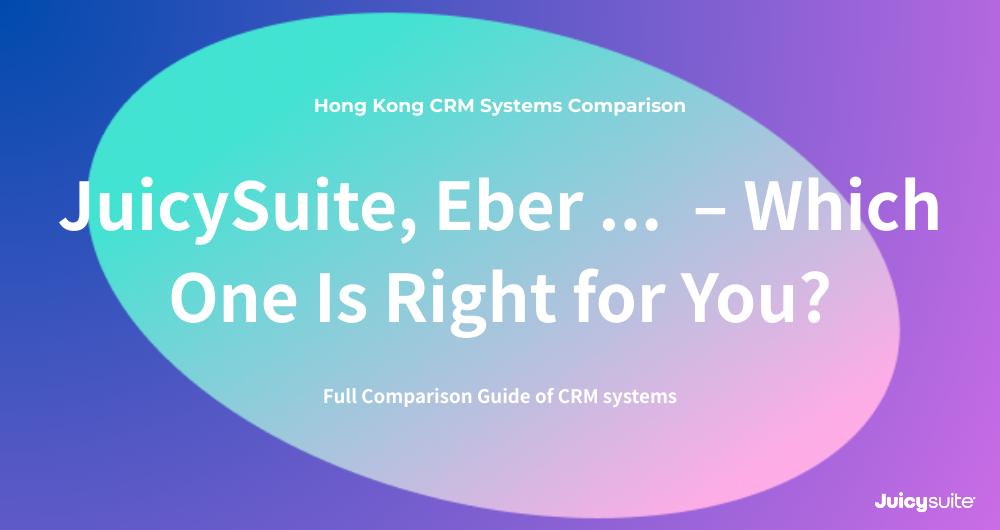Big Data and Marketing: What Every Marketer Needs to Know

In today’s data-driven world, "whoever owns the data, owns the market." From website clicks to mobile app activity, nearly every digital interaction is tracked. Data is now essential for digital transformation, marketing strategies, and business growth.
At the same time, consumer privacy awareness is rising. With the decline of third-party cookies, marketers are asking: How can we continue to understand our customers? One answer lies in owning your data—through effective CRM systems that collect valuable first-party insights.
In this article, JuicySuite walks you through the fundamentals of customer data and how it powers smarter, privacy-friendly marketing strategies.
What Customer Data Are You Being Tracked For? 4 Key Types of Customer Data
Before using data to drive marketing, it’s important to understand the types of customer information being collected online. In general, consumer data can be categorized into four main types:
1. Personal Data
This includes:
- Personally Identifiable Information (PII): Names, email addresses, login credentials, etc.
- Non-PII: IP addresses, browser cookies, device IDs, and information about whether a user is browsing via desktop, mobile, or tablet.
2. Engagement Data
Refers to how users interact with your digital platforms—websites, emails, social media, paid ads, and apps. It includes actions like clicks, views, and open rates.
3. Behavioral Data
This covers:
- Transactional info: Purchase history, average order value, cart abandonment.
- On-site behaviors: Mouse movements, click paths, scroll depth, time spent on pages.
- Product usage patterns: Frequency and feature interaction metrics.
4. Attitudinal Data
These are insights about consumer preferences and intentions, including satisfaction scores, reasons for purchases, and likelihood to recommend.
How Do Marketers and Enterprises Track Your Data?
One of the most common tools: cookies. These small text files store user data in browsers, allowing websites to remember returning visitors, autofill information, or track browsing history.
Besides cookies, marketers also use tools like:
- Google Analytics
- Mixpanel
- Piwik PRO
- Facebook Pixel
- Firebase (for app behavior tracking)
These tools help collect third-party data and generate insights through segmentation and performance analysis. However, as privacy regulations tighten, reliance on these tools is becoming increasingly controversial.
Ethical Concerns in Using Tracking Software
While third-party data has long powered campaign targeting, concerns about transparency and data misuse are rising. Many tracking tools collect more data than users realize, often without clear consent.
Regulatory changes are also underway: Google, for example, is gradually phasing out third-party cookie support in Chrome. This marks a shift toward more ethical, consent-based data strategies.
The Rise of First-Party Data: Own Your Insights
In a post-cookie world, businesses must rely on first-party data—information collected directly from their own platforms. This is where CRM (Customer Relationship Management) systems become essential.
By building a CRM strategy, businesses can collect high-quality data through owned channels (websites, apps, loyalty platforms) and create personalized experiences while respecting user privacy.
JuicySuite helps businesses in Hong Kong implement scalable CRM solutions tailored to their needs. Contact our team for a free consultation.
How to Collect Customer Data More Responsibly
If you want to use tracking technologies ethically, consider the following best practices:
1. Be Transparent
Clearly explain what data you collect and why. For example, display a cookie consent banner with straightforward language about data use.
2. Write Clear Privacy Policies
Ensure your privacy terms are easy to read and outline exactly how customer data is stored and used. Make sure they’re accessible and legally compliant.
3. Explain How You Protect Data
Share your security practices, such as GDPR compliance, encryption, and how breaches would be handled, so users feel confident.
4. Give Users Control
Offer options to manage privacy preferences, disable cookies, or unsubscribe from marketing emails—giving users more autonomy over their data.
Final Thoughts
Big data is a powerful tool, but without trust, it means nothing. As privacy becomes a central concern in marketing, brands need to shift toward responsible data practices and long-term solutions like CRM.
Whether you’re planning a digital transformation or looking for better ways to connect with customers, a data-driven and privacy-respecting approach is the way forward.
Let JuicySuite help you build a customer-first marketing strategy that works in the age of big data.

.png)
.png)